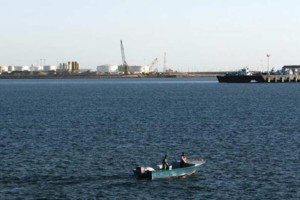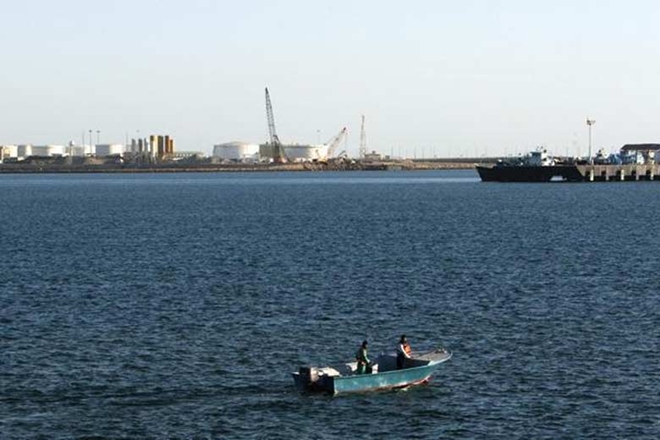 NEW DELHI: India and Iran have signed a significant pact which gives New Delhi operational control of a part of the strategically located Chabahar port on the Gulf of Oman for 18 months.
NEW DELHI: India and Iran have signed a significant pact which gives New Delhi operational control of a part of the strategically located Chabahar port on the Gulf of Oman for 18 months.
The agreement was signed after Prime Minister Narendra Modi held wide-ranging talks with Iranian President Hassan Rouhani, focusing on ramping up regional connectivity and intensifying bilateral trade and investment.
Both sides deliberated extensively on intensifying cooperation in the oil sector and agreed to move beyond traditional “buyer-seller” relationship and develop it into a long-term strategic partnership.
During the talks, it was agreed to continue and increase the pace of negotiation for reaching appropriate results in energy cooperation, including on Farzad-B gas field.
Officials in the Ministry of External Affairs said both the sides were for reaching a conclusion on the Farzad-B gas field issue soon.
Farzad-B was discovered by ONGC Videsh Ltd in the Farsi block about 10 years ago. The project has so far cost the OVL-led consortium, which also includes Oil India Ltd and Indian Oil Corp (IOC), over USD 80 million.
New Delhi is keen that the gas from the field comes to India to feed the vast energy needs and, therefore, OVL in its USD 11 billion master development plan (MDP) proposed drilling wells in Persian Gulf to produce gas, transport it to onshore via sub-sea pipeline and build a plant to liquefy the gas (LNG) for transportation in ships.
On the Chabahar project, a joint statement issued after the Modi-Rouhani talks said both sides reiterated their commitment for early and full operationalisation of Shahid Beheshti Port.
The first phase of the Chabahar port was inaugurated in December last, opening a new strategic route connecting Iran, India and Afghanistan, bypassing Pakistan.
The port in the Sistan-Balochistan province on the energy-rich nation’s southern coast is easily accessible from India’s western coast and is increasingly seen as a counter to Pakistan’s Gwadar Port, which is being developed with Chinese investment and is located at distance of around 80 km from Chabahar.
The lease contract for Shahid Beheshti Port – Phase 1 of Chabahar –- was signed between Port and Maritime Organization of Iran and India Ports Global Limited.
“The Iranian side welcomed the investment of Indian side in setting up plants in sectors such as fertilizers, petrochemicals and metallurgy in Chabahar free trade zone on terms mutually beneficial to the concerned parties,” the statement said.
With a view to fully utilize the potential of the Chabahar port and its connectivity to Afghanistan and Central Asia, India conveyed its readiness to support the development of Chabahar-Zahedan rail line, it said.
Indian Railway Construction International Ltd (IRCON) and Iran’s Construction and Development of Transportation Infrastructure Company (CDTIC), which are engaged in discussions, were tasked to finalize the technical parameters and financing options for the project in a time bound manner.
The Chabahar port is being considered by India, Iran and Afghanistan as a gateway to major opportunities for trade with central Asian countries.
India has been closely working with Afghanistan and Iran to create alternative, reliable access routes for trade as Pakistan has been denying transit access to it.
Under the agreement signed between India and Iran in May 2016, India is to equip and operate two berths in Chabahar Port Phase-I with capital investment of USD 85.21 million and annual revenue expenditure of USD 22.95 million on a 10-year lease.
In May 2016, India, Iran and Afghanistan had inked a pact which entailed establishment of Transit and Transport Corridor among the three countries using Chabahar Port as one of the regional hubs for sea transportation in Iran, besides multi- modal transport of goods and passengers across the three nations.
The statement said both sides reiterated their commitment to International North- South Transport Corridor (INSTC) and stressed on the need for inclusion of Chabahar within its framework.
It was noted that Iran will hold an early meeting of the INSTC Coordination Meeting in Tehran. India’s accession to TIR Convention and Ashgabat agreement was welcomed as additional steps at enhancing regional connectivity and linking regional centers of economic growth,” the statement said.
The Convention on International Transport of Goods Under Cover of TIR Carnets (TIR Convention) is a multilateral treaty that was concluded at Geneva on November 14, 1975, to simplify and harmonies the administrative formalities of international road transport.
Modi and Rouhani also released a joint postage stamp depicting Deendayal Port, Kandla and Shahid Beheshti Terminal, Chabahar that reflected the enhanced prosperity through greater connectivity.-PTI






